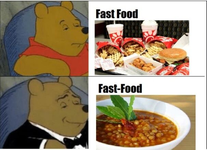Maybe one of you guys can answer this? Tried to ask a priest but didn’t get to it at last nights pre-sanctified.
Why olive oil specifically? We have “approved oils” at our coffee hour and even had some “buttered bread” at a Lenten pitch in once. What’s so special about olive oil? Why am I allowed to cook with coconut and avocado oil?
Why is hard liquor and wine bad news bears? Meanwhile beer is ok as long as you aren’t pounding it and partying. Can someone explain the reasoning? Shouldn’t oil mean oil and wine mean all alcohol?
In antiquity, especially in the Mediterranean, olive oil was THE default cooking oil. It was used everywhere. By
olive oil was meant standard cooking oil, and not, for example, some suplementary, medicinal or fancy oils etc.
Shouldn’t oil mean oil and wine mean all alcohol?
Yes, oil means
all cooking oils and wine means
all alcohol. There is no distinction.
Tried to ask a priest but didn’t get to it
You should, he'll tell you the same thing. Except if he is Elpidophoros or a Fordhamite.
It's the same story as some Catholic monks declared beavers to be aquatic animals so they could eat them as fish during Lent:
"They had discovered an animal that lived in water, had webbed feet and tasted like fish," Wong wrote. "With Lent approaching, they asked the Vatican to grant the animal the status of fish, so they might eat it during the upcoming days of meat-free fasting.
So in the 17th century, the Bishop of Quebec approached his superiors in the Church and asked whether his flock would be permitted to eat beaver meat on Fridays during Lent, despite the fact that meat-eating was forbidden. Since the semi-aquatic rodent was a skilled swimmer, the Church declared that the beaver was a fish. Being a fish, beaver barbeques were permitted throughout Lent. Problem solved!"
And rodents...
"The Church, by the way, also classified another semi-aquatic rodent, the capybara, as a fish for dietary purposes. The critter, the largest rodent in the world, is commonly eaten during Lent in Venezuela. "It's delicious," one restaurant owner told the New York Sun in 2005. "I know it's a rat, but it tastes really good."
And armadillos, tapirs & manatees:
"Prussian naturalist Alexander von Humboldt wrote on capybara meat during his visit to Venezuela in the early 1800s: “The missionary monks do not hesitate to eat these hams during Lent. According to their zoological classification they place the armadillo, the thick-nosed tapir, and the manatee, near the tortoises; the first, because it is covered with a hard armour like a sort of shell; and the others because they are amphibious.”
And alligators...
"Bishop Gregory M. Aymond of New Orleans drew headlines for a letter confirming that “the alligator is considered in the fish family” and thus suitable for consumption during Lent. “Salt and freshwater species of fish, amphibians, reptiles, (cold-blooded animals) and shellfish are permitted,” says the website of U.S. Conference of Catholic Bishops."
And muskrat...
"A 2002 document from the Archdiocese of Detroit confirmed that “there is a long-standing permission to permit the consumption of muskrat on days of abstinence, including Fridays of Lent.” Bishop Kenneth Povish of Lansing described the practice as “immemorial custom” and said that “anyone who could eat muskrat was doing penance worthy of the greatest saints.”
And some birds...
"A monastery in Northern France in the late 1600s found a way around the meatless Friday rule by eating puffin, a seagoing bird known for its stature in the publishing world. The church considered it kosher because “its natural habitat was as much terrestrial as aquatic,” and therefore they should be allowed to classify it as a fish."
https://thefisheriesblog.com/2017/03/01/beavers-are-fish-during-lent/
Of course, those are Cats. They practically don't fast anymore.
So what is the moral of the story? Those who look for excuses will find them, but excuses usually don't lead in the right direction.
And so, lo and behold, at first the beaver was declared a fish, then also the crocodile, and finally the male was declared a female, 54 genders were introduced and the pope blessed homosexual "marriages".



